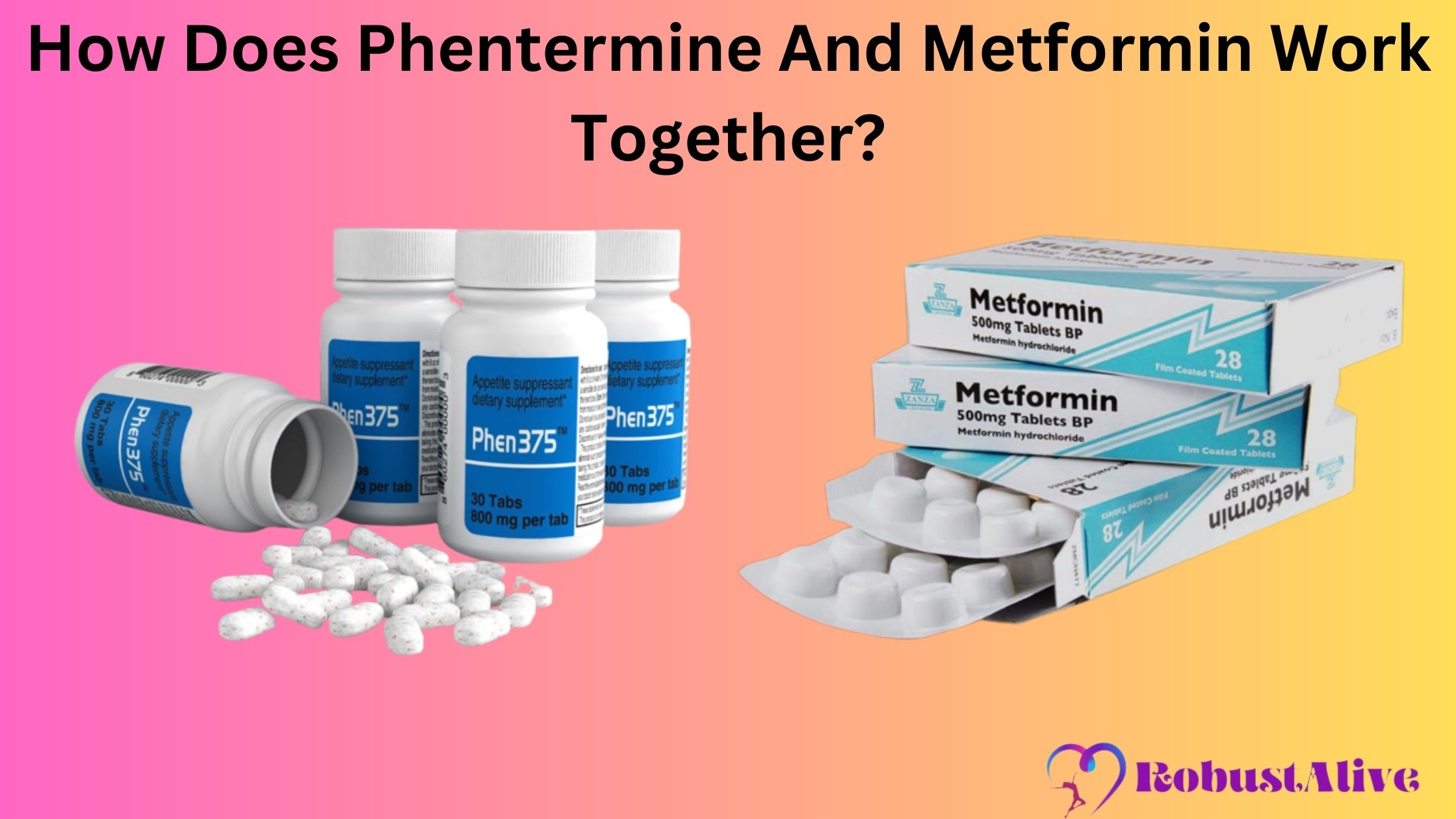How Does Phentermine And Metformin Work Together?

Phentermine and Metformin are two medications commonly prescribed for different purposes. However, their combined use has gained attention recently for weight management.
So, how does Phentermine and Metformin work together?
Phentermine suppresses appetite, aiding weight loss, while Metformin improves insulin sensitivity for blood sugar control. Together, they assist in managing weight and blood sugar levels, particularly in individuals with type 2 diabetes or insulin resistance.
In this article, we’ll explain how Phentermine and Metformin work on their own and explore how their different actions might complement each other when taken together.
What Is Phentermine?
Phentermine is a prescription medication that is commonly used for weight loss purposes. It was approved by the FDA in 1959 and is intended for short-term use, generally up to 12 weeks. It is prescribed to individuals who are overweight or obese and have weight-related health conditions such as high blood pressure, high cholesterol, or type 2 diabetes.
Phentermine is classified as a stimulant and is chemically similar to amphetamines. It works by suppressing appetite and increasing energy expenditure, helping individuals to consume fewer calories and lose weight. Phentermine is available under various brand names, such as Adipex-P, Lomaira, and Suprenza.
It is essential to note that Phentermine is a controlled substance due to its dependence and abuse. Therefore, it can only be obtained with a valid prescription from a healthcare professional. Before prescribing Phentermine, healthcare providers typically recommend other weight loss plans, such as exercise and a calorie-reduced diet.
What Is Metformin?
Metformin is a prescription medication primarily used to treat type 2 diabetes. It helps lower blood sugar levels by improving the body’s response to insulin, a hormone that regulates blood sugar.
People with type 2 diabetes have a condition known as insulin resistance, where their body becomes less sensitive to the effects of insulin. This leads to elevated blood sugar levels. Metformin works by reducing the amount of glucose produced by the liver and increasing the body’s sensitivity to insulin, allowing better control of blood sugar levels.
Some brand-name versions of Metformin include Glucophage (immediate-release), Glumetza, and Fortamet (extended-release). However, Metformin is also available as a generic medication, which is a more affordable option. Generic drugs contain the same active ingredients as their brand-name counterparts and are considered equally safe and effective.
It’s worth noting that while Metformin is primarily used for type 2 diabetes, it may also be prescribed for certain other conditions, such as polycystic ovary syndrome (PCOS) and prediabetes.
The specific usage and dosage will depend on your individual needs, so following your doctor’s instructions and regularly monitoring your blood sugar levels is essential.
How Does Phentermine And Metformin Work Together
Phentermine and Metformin work together in different ways to help individuals manage weight and control blood sugar levels.
Appetite Suppression
Phentermine, as a stimulant, stimulates the release of neurotransmitters like norepinephrine, dopamine, and serotonin in the brain. This stimulation helps suppress appetite and reduce food cravings. By targeting the central nervous system, Phentermine can decrease feelings of hunger and promote a sense of fullness, making it easier for individuals to control their calorie intake.
Insulin Sensitivity
Metformin works primarily by targeting the liver. It reduces the production of glucose in the liver and inhibits the release of stored glucose into the bloodstream. This action helps lower blood sugar levels. Additionally, Metformin improves insulin sensitivity in muscle cells, allowing them to better absorb glucose from the bloodstream. By enhancing insulin sensitivity, Metformin helps the body utilize insulin more effectively, leading to better blood sugar control.
Weight Loss
Phentermine’s appetite-suppressing effects can support weight loss efforts. By reducing calorie intake and promoting a calorie deficit, individuals taking Phentermine may experience weight loss. This is particularly beneficial for individuals who struggle with overeating or have difficulty controlling their appetite.
Blood Sugar Control
Metformin’s ability to lower blood sugar levels and improve insulin sensitivity is crucial for individuals with type 2 diabetes or insulin resistance. By reducing glucose production and increasing glucose uptake by cells, Metformin helps regulate blood sugar levels and prevent spikes and crashes in blood glucose. This can contribute to better overall glycemic control and reduce the risk of complications associated with high blood sugar levels.
When taken together, Phentermine and Metformin can complement each other’s effects. Phentermine helps control appetite and reduce calorie intake, which benefits weight loss. Metformin helps improve insulin sensitivity, which can aid in managing blood sugar levels, particularly in individuals with type 2 diabetes.
The combination of Phentermine and Metformin can be useful for individuals who are overweight or obese and have type 2 diabetes or insulin resistance. By suppressing appetite and reducing calorie intake, Phentermine can support weight loss efforts. Metformin can help improve insulin sensitivity, leading to better blood sugar control.
It’s important to note that the use of Phentermine and Metformin together should always be under the guidance and supervision of a doctor. They can assess the individual’s specific needs, consider potential risks and benefits, and determine the appropriate dosage and duration of treatment.
How Long Can You Take Phentermine And Metformin Together?
The duration for which Phentermine and Metformin can be taken together can vary depending on individual factors and medical conditions. It is crucial to consult with a doctor, such as a doctor or pharmacist, who can provide personalized advice based on your specific situation.
Generally, the combination of Phentermine and Metformin is not typically prescribed for long-term use. Phentermine is an appetite suppressant used for short-term management of obesity, usually for a few weeks or a few months at most. Metformin is primarily prescribed for the management of type 2 diabetes and may be used for a longer duration.
However, if both medications are prescribed together for weight loss, it is important to follow your doctor’s guidance regarding the duration of treatment. They will consider factors like your overall health, weight loss goals, and potential risks and benefits to determine an appropriate duration.
What Are The Side Effects of Taking Phentermine And Metformin
Indeed, there are potential risks and side effects associated with the use of Phentermine and Metformin. Here are some of the common ones:
Phentermine:
- Dizziness
- Headache
- Dry mouth
- Insomnia (difficulty sleeping)
- Constipation
- Increased heart rate
- Elevated blood pressure
- Restlessness or nervousness
- Mood changes or irritability
- Potential for dependence or abuse
Metformin:
- Nausea
- Diarrhea
- Abdominal discomfort or cramping
- Loss of appetite
- Metallic taste in the mouth
- Vitamin B12 deficiency (with long-term use)
- Rarely, lactic acidosis (a serious condition that can occur in individuals with kidney or liver problems)
It’s important to note that not everyone will experience these side effects, and the severity and likelihood of side effects can vary among individuals. Additionally, there may be other less common or rare side effects associated with these medications.
Benefits Of Taking Phentermine And Metformin Together
Combining Phentermine and Metformin offers several benefits when it comes to weight loss and overall metabolic health.
- Maximizes weight loss: Taking Phentermine and Metformin together can enhance weight loss efforts by combining the appetite-suppressant effects of Phentermine with the metabolic benefits of Metformin.
- Reduced cravings: Phentermine helps suppress appetite and reduce cravings for high-calorie foods, making it easier to stick to a healthy diet.
- Increased fullness: Phentermine can help you feel fuller for longer, reducing the tendency to overeat or snack between meals.
- Improved insulin sensitivity: Metformin increases the body’s sensitivity to insulin, which can help regulate blood sugar levels and improve metabolic health.
- Better blood sugar control: By controlling blood sugar levels, the combination of Phentermine and Metformin can benefit individuals with insulin resistance or diabetes.
- Enhanced metabolic health outcomes: Taking these medications together can improve metabolic health, including better control of blood pressure, cholesterol levels, and overall cardiovascular health.
Drug Interactions Between Phentermine And Metformin
When taking Metformin and Phentermine together, there are a few important interactions to be aware of. As you lose weight with Phentermine, the dosage of Metformin or any other diabetic medications you take may need to be adjusted.
It’s crucial to monitor your blood sugar levels more frequently during and after phentermine treatment and inform your doctor if you experience symptoms of low blood sugar, such as headache, dizziness, confusion, or rapid heartbeat.
Remember to communicate with your doctor about all your medications, including vitamins and herbs, and avoid making any changes without consulting them first.
Metformin And Phentermine Food Interactions
Metformin
Taking Metformin with meals is recommended. However, it’s important to avoid excessive alcohol consumption while using Metformin. Combining Metformin with alcohol can increase the risk of a rare but serious condition called lactic acidosis. This condition involves a buildup of lactic acid in the blood and can be potentially life-threatening. If you have kidney or liver disease, congestive heart failure, or dehydration, the risk of lactic acidosis is higher.
Seek immediate medical attention if you experience symptoms such as fatigue, muscle pain, abdominal discomfort, irregular heartbeat, or difficulty breathing. Furthermore, alcohol can affect blood glucose levels, leading to low and high blood sugar levels depending on the amount and frequency of alcohol consumption. If you have diabetes, it’s advisable to limit alcohol intake, especially when taking Metformin.
Alcohol on an empty stomach or after exercise may increase the risk of low blood sugar. It’s essential to discuss any concerns or questions you have about Metformin with your doctor or pharmacist.
Phentermine
When it comes to Phentermine, it is recommended to avoid or limit alcohol consumption. Using Phentermine with alcohol can heighten the risk of cardiovascular side effects like increased heart rate, chest pain, or changes in blood pressure. Additionally, nervous system side effects such as dizziness, drowsiness, depression, and difficulty concentrating may be more likely to occur when combining Phentermine with alcohol.
It’s important not to exceed the recommended dosage of Phentermine and to refrain from activities that need mental alertness, such as driving or operating machinery until you understand how the medication affects you. Always inform your doctor about all the medications, vitamins, and herbs you are using, and do not discontinue any medication without consulting your doctor first.
Conclusion
In conclusion, the combination of Phentermine and Metformin holds promise as a synergistic approach to weight management and blood sugar control.
However, it is essential to use them under medical supervision and adhere to prescribed dosages. Consultation with healthcare professionals is crucial for personalized guidance and to ensure safety and effectiveness.





